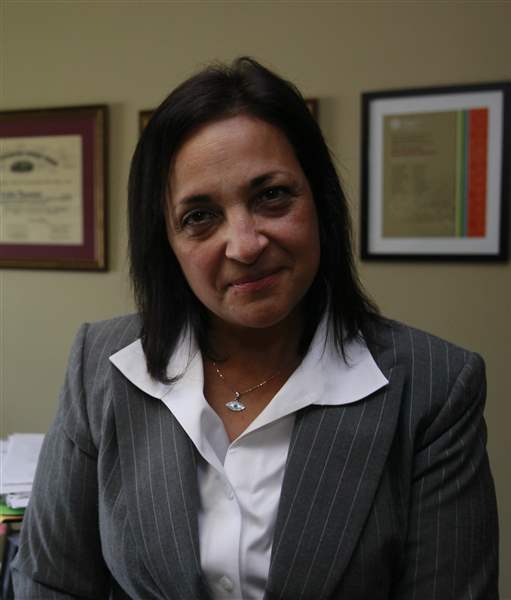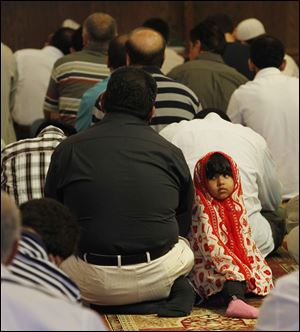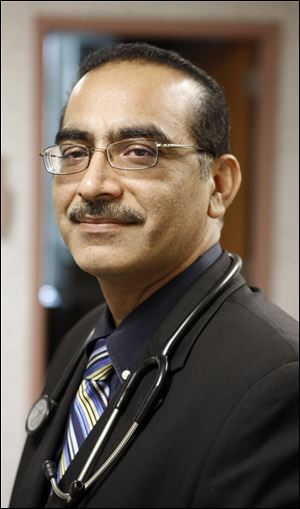
AN ISSUE OF FAITH
Area Muslims strive to counter 'Islamophobia'
Work still needed locally to overcome stereotypes
9/11/2011
Linda Mansour says area Muslims have made progress in educating the community about Islam, but the gains are often offset by negative comments.
The Blade/Jetta Fraser
Buy This Image

Linda Mansour says area Muslims have made progress in educating the community about Islam, but the gains are often offset by negative comments.
Ten years ago Sunday, Toledo attorney Linda Mansour was watching the 9/11 terror attacks on a courthouse TV when friends and colleagues gave her hugs and words of support.
"It made it better, but it made it worse because it meant that I was immediately identified [with the terrorists]," Ms. Mansour said in a recent interview.
Recalling the events, the feisty attorney and human rights activist had to fight back tears.
"When you ask me, I start crying. And I'm surprised," she said.
As a Muslim American, Ms. Mansour said she experienced the same feelings of shock and pain as anyone who witnessed the attacks. But she also had to endure the additional burden of being linked by her faith to the perpetrators who claimed to be Muslims.
"The feelings of compassion and sympathy from my colleagues were well-meant, but they clearly meant that I was being identified [with terrorists]," she said.
Muslims in northwest Ohio said in recent interviews that they enjoy extraordinarily good relationships with the general community, but there is still much work to be done to overcome stereotypes and to educate the public about their faith.
A large part of the problem is the anti-Islam rhetoric emanating from talk shows, some politicians and pastors, and other national figures who find that stirring up controversy is good for ratings and fund-raising.
"We have an exceptional community in the Toledo area on all levels," said Dr. Abed Alo, a member of the board of trustees of the Masjid Saad mosque in Sylvania. "On a personal level, I think maybe it's getting a little better. But with the election heating up, it's going to get worse because some of the people running campaigns are making Islamophobia their agenda. It's the same old story."
Ms. Mansour said area Muslims have made progress in building relationships and educating the community about Islam, but the gains are often offset by anti-Muslim comments and hatred carried by networks, cable, and the Internet.

Yasser Ghafoor worships with his daughter, Ruba, 2, by his side at the Islamic Center of Greater Toledo in Perrysburg.
"In Toledo, we know each other. We're more familiar. But on the larger scope, it's getting worse. … It's not like people locally are isolated from national news," she said.
Dr. Faizan Hafeez, president of the board of the Islamic School of Greater Toledo, said Muslims' outreach to the community needs to be a constant effort.
"It's an ongoing process. The community is doing some outreach projects. They do it on an off-and-on basis. But I think there is a need to do a little bit more."
Saturday, area mosques made such an effort, opening their doors for a "Day of Unity: Remembrance of 9/11." Participants included the two largest local mosques, Masjid Saad and the Islamic Center of Greater Toledo in Perrysburg, each of which serves more than 500 families, and the Toledo Muslim Community Center, the newest local mosque that moved to West Sylvania Avenue this year.
The Islamic Center, a distinctly Middle Eastern-style building with a dome and twin minarets, sits in a prominent spot at the juncture of I-75 and I-475 south of Toledo.
Abdel-Wahab Soliman, a member of the center's public relations committee, said the Day of Unity was held to answer people's questions about Islam. Local clergy of all faiths were welcome to come to the mosques and pray, he added.
Dr. Hafeez, 45, a neurologist who graduated from Dow Medical College in Pakistan, trained at the University of Wisconsin, and then returned to Pakistan in 1999 before returning to the United States in 2002. He said he chose Toledo because of the thriving Muslim community, among other things.
"I think we are blessed with a very good community in Toledo overall. The Muslims in Toledo have done much better than in other places, and I guess the credit mainly goes to the people of Toledo. It's been nothing but a positive experience," Dr. Hafeez said.

Dr. Faizan Hafeez, a neurologist, says he chose Toledo because of the thriving Muslim community, among other things.
Ms. Mansour pointed out that Toledo has not been without incident, citing the case of three local Muslim men convicted in 2008 of plotting to commit terrorism-related acts. Those three are serving time in federal prison.
But she also expressed concern that the government is violating civil rights in the name of anti-terrorism. "For Arab and Muslim Americans, silence is not an option," Ms. Mansour said. "They are the most vulnerable to the consequences of any terror attack or policies based on fear and exclusion."
When incidents of terrorism arise around the globe, Mr. Soliman said, the media tend to "take things out of context" in linking Islam to the attacks. Yet the vast majority of the world's 1.2 billion Muslims are law-abiding, peace-loving people who denounce terrorists and their deeds, he said.
"The stereotype is unfortunate, but my feeling is that this wave of terrorism and its ideology cannot succeed," Mr. Soliman said. "People have found a way to change through peaceful revolutions like the 'Arab Spring,' and people no longer will subscribe to violence."
A new study by the Washington-based Pew Forum on Religion & Public Life found U.S. Muslims to be more moderate than those in other nations.
"Muslims in the United States continue to reject extremism by much larger margins than most other Muslim publics around the world, and many express concern about the possible rise of Islamic extremism," the Pew study said.
Mr. Soliman and other local Muslims pointed to the support demonstrated by the community on Sept. 18, 2001, when 1,500 people of all faiths encircled the Perrysburg mosque, joining hands, singing songs, and praying for the safety of those who worshipped within. "The circle around the center, that was [Toledo Christian radio station] YES-FM that reached out to us," said Cherrefe Kadri, then president of the board of the Islamic Center. "We weren't saying, 'Come and hug us.' People were taking affirmative steps to do random acts of kindness."
After someone fired a bullet through one of the center's stained-glass windows days after 9/11, some non-Muslims sent checks to help pay for repairs. Others left flowers and potted plants at the door of the mosque.
"It was truly beautiful," Ms. Kadri said. "I think it just goes to show that there's more good than evil in the world. And I think good wins out."
Contact David Yonke at: dyonke@theblade.com or 419-724-6154.